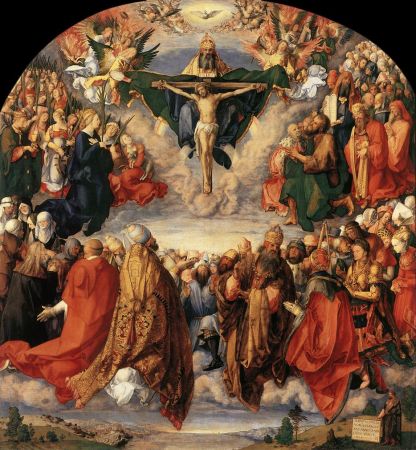The Mystery Of The Holy Trinity By: Fr. Dr. Mathew Vaidyan
 We learn from Eusebius, the Church historian, that the Church conferred the title of ‘Theologian’ on St. John the Evangelist and on St. Gregory of Naziansus. St. John proclaimed the ‘Theosness of Logos’ and St. Gregory advocated the faith in the Holy Trinity. It was under certain special circumstances that they proclaimed that Logos is God. On the one hand, while the Greek thinkers accepted Logos only as a representative force proceeding from God, on the other, the Arian heretics denied the Theosness’ of Jesus Christ , the second person in the Trinity. These incorrect views urged the early Fathers of the Church to a proper study of the true relationship of the persons of the Holy Trinity. Thus they were led to develop theology as a branch of learning that defines the true nature of the Trinity.
We learn from Eusebius, the Church historian, that the Church conferred the title of ‘Theologian’ on St. John the Evangelist and on St. Gregory of Naziansus. St. John proclaimed the ‘Theosness of Logos’ and St. Gregory advocated the faith in the Holy Trinity. It was under certain special circumstances that they proclaimed that Logos is God. On the one hand, while the Greek thinkers accepted Logos only as a representative force proceeding from God, on the other, the Arian heretics denied the Theosness’ of Jesus Christ , the second person in the Trinity. These incorrect views urged the early Fathers of the Church to a proper study of the true relationship of the persons of the Holy Trinity. Thus they were led to develop theology as a branch of learning that defines the true nature of the Trinity.
The word theology was widely used by the Classical Greek thinkers to describe their Gods. Great poets like Homer and Hasius have often used this term while describing the gods and their deeds. In ‘The Republic’, Plato uses ‘theology’ to refer to the Supreme Reality or the Ultimate Ground of all things (The Republic 379A)
Aristotle uses the term, ‘theology’, to mean the branch of philosophy that connects the universe to the Ultimate Reality that is the Unmoved Mover (‘Metaphysics’102). He speaks of the three fields of knowledge, namely physics, Mathematics and Theology, In his opinion, theology is the most important of the three branches.
The Stoics of the pre-Christian times divided theology into three branches: mystical, natural and civil, and described theology as the science explaining the knowledge obtained by spiritual exercises. St. Clement of Alexandria and Origen are two of the early Christian writers who have attempted a definition of theology. According to them, theology deals with the Incarnation of our Lord. Origen in his book interpreting the Gospel according to St. John asserts that the true theologian is the one who witnesses the Lord. Later in the 4th centaury A. D with the rise of the Arian heresy the term ‘theology’ is seen to have been used in the Church to refer to the relationship of the persons in the Holy Trinity.
The Church at that time is seen to have taught that the real theologian is the one who proclaims and believes that the Logos that became flesh is the real God. The Fathers of the Church tried to make a clear distinction between economy or the deeds of the Incarnate and theology or the eternal relationship of the persons constituting the Holy Trinity. The supporters of Arius laid great stress on the verse ‘My Father is greater than I’ (St. John 14:28). They argued that the Father and the Son were not equals. There argument that since the Son is lesser than the Father, he is not God. was simplistic. The Fathers of the Church, however, pointed out that it was as the Son in flesh and blood that Jesus Christ had made this pronouncement and that the Father was greater as long as the Son was living among men as a full man. They further taught that the Incarnation was a reflection of God’s compassion, acts of redemption and self-emptying.
The Incarnation reveals the chosen way of God to discipline the creation. The created comes to know the Creator through Christ; worship Him and experiences Him. A Christian life based on this belief enables us to have divine revelations about the mystery of the Holy Trinity.
St. Paul explains: ‘For he has made known to us in all wisdom and insight the mystery of his will, according to his purpose which set forth in Christ as a plan for the fullness of time, to unite all things in him, things in heaven and thing on earth. In him, according to the purpose of him who accomplishes all things according to the Counsel of his will, we who first hoped in Christ have been destined and appointed to live for the praise of his glory (Ephesians 1:9-12). In short, through the incarnation of our Lord, the mystery of the will of God was revealed. It is on this basis that theology is defined as a branch of learning that describes the mysteries of God as revealed through history and illuminated by faith. Some define theology as ‘faith seeking understanding’.
God reveals His mysteries which are distinct from worldly knowledge. ‘But we impart a secret and hidden wisdom of God which God decreed before the ages for our glorification… God has revealed to us through the Spirit. For the Spirit searches everything, even the depths of God. For what person knows a man’s thoughts except the spirit of the man which is in him? So also no one comprehends the thoughts of God except the spirit of God (1 Cor. 2:7-12). The Spirit of God reveals the hidden mysteries inherent in the Holy Trinity to those who love Him. This is the basis of Christian theology.
Source: IOH